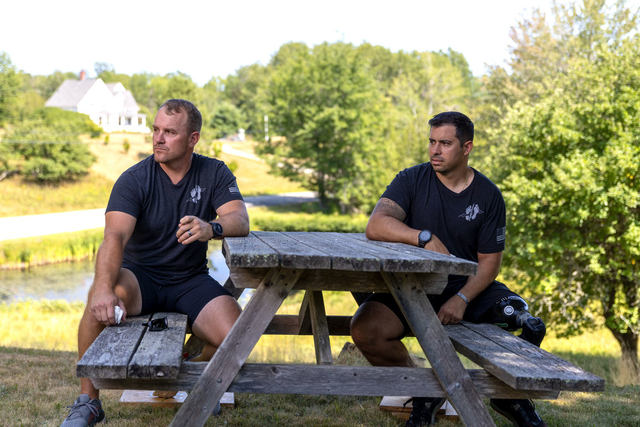Story by David Nye Photos by Craig Orsini
August O’Niell’s family is filled with service members and veterans. He and his brother are Air Force pararescuemen and his mom, dad, and stepdad are all Air Force veterans, so the family knew the risk of getting the call that no one wants.
Still, they all remember where they were when they got the news that August, while attempting to pull a wounded soldier out of a firefight, suffered leg wounds from a burst of machinegun fire in Afghanistan. His mom, Deborah, got the news first and called her oldest son, Robert, to try and get news of what was happening.

Robert was already on his way to his unit headquarters. “I’m backing out of the driveway. I see my mom calling on the cell phone. I knew something was wrong. I answered the phone. She was crying. She wasn’t screaming and yelling, but she was freaking out and saying, ‘Something’s happened to August. I don’t know what’s going on. Nobody’s telling me anything.’
Which is not how the process is supposed to work. And I just said, ‘Stop. I’m going into work. Those people will be able to get answers. I’ll call you when I know something.’”
Robert was able to get news that his brother was alive, but it was bad. His unit immediately got him a flight to Landstuhl, Germany for him to be with August.
“So I packed a 36-hour bag. I had two children, and my wife was pregnant at the time. So I told her, ‘Hey, I’m going to meet Augie.’ And you know, my wife was fully supportive. And I got on a plane.”

As a pararescueman, he had some medical knowledge and, when he saw the leg wounds, knew that August was in for a tough recovery. He sent news back to the family and, exhausted, settled into the hospital room to be close to his brother. He even presided over August’s re-enlistment in the hospital. He stayed there for about two days, sleeping in the chair before being told about Fisher House.
“I’m sitting there, concerned about what August’s life is going be like after this. When I initially heard Fisher House, I didn’t know what that was. I honestly initially just thought ‘We’re going to the barracks. Fine.’”
Instead, Robert was ushered into the Landstuhl Fisher House where he was able to get food as he went to and from the hospital, a safe place to stay near August, and comfort.

“I felt like I was surrounded by family because everyone else in there was dealing with something like this. Right? So when I passed someone in the hall, the conversation felt very natural. It wasn’t like talking to a random stranger. I knew the person that I was engaging with in the hall that day or at the kitchen, or who was offering me some dinner that they had just made, I knew that they were there for the same purpose that I was, that there was an injured family member in the hospital.”
He was only the first member of the family to stay at a Fisher House and find comfort with the other families staying there.
August’s injuries were bad enough that he spent three years attempting to rehabilitate his leg before opting for an amputation. Through about 20 surgeries, his mother, sisters, father, and stepfather all came to support him at hospitals in D.C. and Texas, usually staying at a nearby Fisher House.
“So August went through this, he got shot in 2011,” Debbie, August’s mom, said. “They didn’t take the leg till 2014. August used the Fisher House multiple times. It supported his whole family, depending on who he needed for which operation the Fisher House supported us.”

August even got to join them in a Texas Fisher House. Knowing that his family was taken care of helped him focus on healing.
“It’s comforting knowing that you are not a burden on people because that’s the initial thought, right?” August said. “You’re used to being the savior, not the person that everybody’s trying to fix.”
“Them being [at Fisher House] where there were constantly people coming in and bringing food, there was constantly that community there, where they were able to talk to other family members that had been there a while. And then on top of that, be there for me when I needed them to be, that was just, it’s irreplaceable.”

“I could literally see the Fisher House right outside of my window,” August said. “And so there were multiple times when I’d say bye, and I’d see them turning around and waving, even though they couldn’t tell which room or window was mine, but they’d wave at the hospital and I’d wave.”
August remains on active duty and continues to serve as an Air Force pararescue jumper. He also is an adaptive athlete.
Since his 2011 injury, Fisher House Foundation has been able to support his family members at Warrior Games and Invictus Games where he competed and earned medals in swimming, weightlifting, and team sports.

















